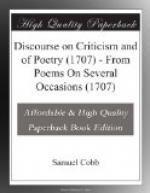Rash Errours of an injudicious Muse.
Such Wit, like Lightning, for a while looks Gay,
Just gilds the Place, and vanishes away.
In one continu’d blaze He upwards sprung,
Like those Seraphick flames of which He Sung.
If, Cromwel, he laments thy Mighty Fall
Nature attending Weeps at the Great Funeral.
Or if his Muse with joyful Triumph brings
the Monarch to His Ancient Throne, or Sings
Batavians worsted on the Conquer’d Main,
Fleets flying, and advent’rous Opdam Slain,
Then Rome and Athens to his Song repair
With British Graces smiling on his Care,
Divinely charming in a Dress so Fair.
As Squadrons in well-Marshal’d order fill
The Flandrian Plains, and speak no vulgar Skill;
So Rank’d is every Line, each Sentence such,
No Word is wanting, and no Word’s too much.
As Pearls in Gold with their own Lustre Shine,
The Substance precious, and the Work Divine:
So did his Words his Beauteous Thoughts inchase,
Both shone and sparkled with unborrow’d Grace,
A mighty Value in a little Space.
So the Venusian Clio sung of Old,
When lofty Acts in well-chose Phrase he told.
But Rome’s aspiring Lyrick pleas’d us less,
Sung not so moving, tho’ with more Success.
O Sacharissa, what could steel thy Breast,
To Rob Harmonious Waller of his Rest?
To send him Murm’ring thro’ the Cypress-Grove,
In strains lamenting his neglected Love.
Th’ attentive Forest did his Grief partake,
And Sympathizing Oaks their knotted Branches shake.
Each Nymph, tho’ Coy, to Pity would incline;
And every stubborn Heart was mov’d, but Thine.
Henceforth be Thou to future Ages known;
Like Niobe, a Monument of Stone.
Here could I dwell, like Bees
on Flowry Dew,
And Waller’s praise Eternally
pursue,
Could I, like Him, in Harmony excel,
So sweetly strike the Lute, and Sing so
Well.
But now the forward Muse converts
her Eye
To see where Denham, and Roscommon
fly,
Cautiously daring, and correctly High.
Both chief in Honour, and in Learning’s
Grace,
Of Ancient Spirit, and of Ancient Race.
Who, when withdrawn from Business, and
Affairs,
Their Minds unloaded of tormenting Cares,
With soothing Verse deceiv’d the
sliding Time,
And, unrewarded, Sung in Noble Rhyme.
Not like those Venal Bards, who Write
for Pence,
Above the Vulgar were their Names and
Sense,
The Critick judges what the Muse
indites,
And Rules for Dryden, like a Dryden,
Writes.
’Tis true their Lamps were of the
smallest Size,
But like the Stoicks[4], of prodigious
Price.
Roscommon’s Rules shall o’er
our Isle be Read,
Nor Dye, till Poetry itself be Dead.
Fam’d Cooper’s Hill
shall, like Parnassus, stand,
And Denham reign, the Phaebus
of the Land.




